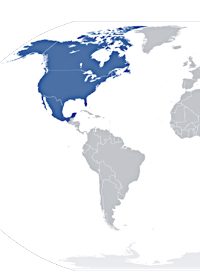
One of the most dangerous and pressing threats to American sovereignty is the proposed creation of the North American Union, a European Union-style amalgamation of the United States, Canada, and Mexico into a borderless, unified continental body. In the United States, one of the main proponents of the NAU has been former President George W. Bush, whose policy of open borders and a lenient approach to immigration is indicative of his desire to erase national borders, under the guise of a “Security, Peace, and Prosperity Partnership of North America.”
While many pundits on the left, such as MSNBC’s Rachel Maddow, falsely claim that constitutionalists and patriotic Americans are paranoid, and that their warnings about the threats of the erosion of American sovereignty are unfounded conspiracy theories, the objective evidence clearly indicates that a European Union-style confederation is a desired policy goal in the works among globalist elites.
Aside from former President Bush, one of the leading proponents of the North American Union is the powerful Canadian member of Parliament Hugh Segal, who argues that such an arrangement would benefit Canada (presumably at America’s expense). In his new book The Right Balance: Canada’s Conservative Tradition, Senator Segal offers a flimsy “conservative” defense of a North American Union, not unlike the faux conservative defense of the same globalist venture offered by the neoconservative (as distinguished from paleoconservative) President Bush.
Segal gives the following reasons why a North America Union would be beneficial for Canada (and, he believes, the United States as well):
A North American Community is not about the victory of the right or the left in this country, the United States or Mexico. With just a touch of statecraft and leadership, it could be about the coming together of our Canadian commitments to both economic performance and social justice with a far-sighted vision that sees Americans and Mexicans as among the very best allies in the world. Who in the world would we rather have as allies and fellow travelers in pursuing the twin challenges of economic performance and social justice?
We have reached the point where our national interests — economic, social, security and the rest — are now best served by a North American Community engaged in the economic broadening and institutional cohesion that generates focus and opportunity.
Segal also admits that he sees national sovereignty and its defense as antiquated, misguided goals, and advocates for the North American Union on the grounds of social democracy (i.e., he sees it as an ideal means of advancing an agenda of socialism under the guise of democracy):
Sovereignty is not a goal. The narrow-minded focus on sovereignty as a purely self-fulfilling goal is the refuge of those who fear the broader context of visionary thinking. The opportunity to create a community that enshrines democratic principles, enhances economic growth and opportunity, deepens trade and regulatory cooperation, increases social justice and economic development, and forms a basis for a hemispheric Community of the Americas should excite and inspire.
With “Conservatives” Like These, Who Needs Liberals?
Ironically, the one common thread uniting Bush and Segal is their supposed “conservatism,” better defined as neoconservatism. Such “conservatives” have been the leading proponents of the North American Union, and share several common political beliefs.
The similarities between Bush and Segal are uncanny. The Canadian Senator is a self-identified “progressive conservative,” with an ideology even to the left of Trotskyite neoconservatism, or British Thatcherism — described by political scientist Gad Horowitz as “Red Toryism,” because of its similarities with socialism, which is associated with the color red.
Segal does not stand for such principles as free markets, natural rights, his nation’s sovereignty, or limited government (ideas which are distinctly, although not exclusively, American), but instead advocates for “good government, order, balance between left and right, mutual responsibility, harmony between the classes, economic progressivism, and social justice.”
Segal even stated that “individual rights and personal responsibility are not absolute.” This opinion should not be surprising, considering that his own party claims to extol the diametrically opposed ideologies of progressivism and conservatism at the same time, explaining its support for basic elements of the welfare state (i.e., a social safety net) and its belief in “good government,” as opposed to limited government.
Unsurprisingly, this cheerleader for the North American Union also harbors animosity toward those who fought for America’s independence. Segal denigrates the memory and cheapens the dedication of the brave early patriots who gave their lives for the principles of life, liberty, and property, by claiming in a speech to the National Press Club in 1995 that the American Revolution was fought to satisfy “uniquely American materialistic impulses”:
The American Revolution was of a selfish and directionless nature. It was more about self-interest, mercantile opportunity, and who collected what tax than it was about tolerance or freedom. Americans hounded the Tories and Loyalists out of their newly independent colonies. America’s beginnings were profoundly exclusionary, anti-communitarian and repressive of free speech.
These new conservative Canadian residents, who were loyal to the Crown, would help build our national identity in English Canada, help influence our social, economic and political landscape, help defend the role of faith in society — not negate it — and help define Canada as a place different from … the United States. Their politically conservative, economically progressive and deeply-suspicious-of-American populism tenor would become foundational for Canadian conservatism itself.
Similarly, former President Bush cannot be said to be a proponent of true American conservatism, often called paleoconservatism, the philosophy perhaps best manifested by Sen. Robert A. Taft (R-Ohio) who served in the Senate from 1939-1953. Bush’s policies ultimately entailed a greater centralization of government, an increase in the size and scope of the federal government, and fiscal recklessness — hardly conservative ideals. These included:
• A foreign policy of democracy-building
• The largest expansion of the welfare state in 40 years (Medicare Part D and the federal Child Insurance Plan, among others)
• The creation of new federal agencies and the expansion of bureaucracy
• Keynesian economic policies (i.e., TARP and stimulus spending)
• Repression of civil liberties and violation of the First, Fourth, and Fifth Amendments
• Seeking the approval of the United Nations as a pretext for entering war
• Appeasing Russia and China, while abandoning America’s ally Taiwan
• Meddling in Israel’s affairs as well as those of other countries
• Allowing the flood of illegal immigration to continue unchecked
These are all policies which can hardly be considered conservative, though they do fit into the neoconservative agenda. In fact, Bush’s prevailing ideology was oddly labeled “compassionate conservatism,” thematically similar in intent and focus to Segal’s “progressive conservatism.”
It is therefore no surprise that these individuals have been most influential in leading Canada and the United States down the road of an eroded national sovereignty. Segal himself is a man of great power and influence within the upper echelons of the Establishment: He is a former member of the Trilateral Commission, and in an editorial in The Globe and Mail, advocates for a guaranteed annual income for all Canadians, a prime example of socialism:
Thousands of working men and women have come to look to me as their protector and their champion. I feel that I cannot now fail them. In my official capacity I have traveled the middle of the road, but now that you have put the extreme alternative to me, my place is marching with the workers rather than riding with General Motors. Forty years later, the time for action on the GAI is upon us. Leaving the challenge of poverty to the side is to deny the essential decency and balance Canadians have always shared.
Likewise, it is the presence of so-called moderate Republicans in internationalist bodies such as the Council on Foreign Relations (CFR) that also serves to legitimize the North American Union.
Related article: Faux (Neo) Conservatives Defend the North American Union



